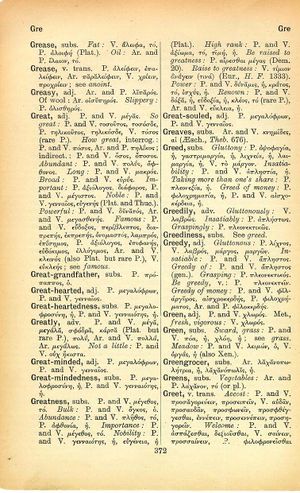great
Ὥσπερ αὐτοῦ τοῦ ἡλίου μὴ ὄντος καυστικοῦ, ἀλλ' οὔσης ζωτικῆς καὶ ζωοποιοῦ θέρμης ἐν αὐτῷ καὶ ἀπλήκτου, ὁ ἀὴρ παθητικῶς δέχεται τὸ ἀπ' αὐτοῦ ϕῶς καὶ καυστικῶς· οὕτως οὖν ἁρμονίας οὔσης ἐν αὐτοῖς τινὸς καὶ ἑτέρου εἴδους ϕωνῆς ἡμεῖς παθητικῶς ἀκούομεν → Just as although the Sun itself does not cause burning but has a heat in it that is life-giving, life-engendering, and mild, the air receives light from it by being affected and burned, so also although there is a certain harmony and a different kind of voice in them, we hear it by being affected.
English > Greek (Woodhouse)
adjective
so great: P. and V. τοσοῦτος, τοσόσδε, P. τηλικοῦτος, τηλικόσδε, V. τόσος (rare P.).
how great, interrog.: P. and V. πόσος, Ar. and P. πηλίκος; indirect.: P. and V. ὅσος, ὅποσος.
abundant: P. and V. πολύς, ἄφθονος.
important: P. ἀξιόλογος. διάφορος, P. and V. μέγιστος.
noble: P. and V. γενναῖος, εὐγενής (Plato and Thuc.).
powerful: P. and V. δυνατός, Ar. and V. μεγασθενής.
famous: P. and V. εὔδοξος, περίβλεπτος, διαπρεπής, ἐκπρεπής, ὀνομαστός, λαμπρός, ἐπίσημος, P. ἀξιόλογος, ἐπιφανής, εὐδόκιμος, ἐλλόγιμος, Ar. and V. κλεινός (also Plato but rare P.), V. εὐκλεής; see famous.

